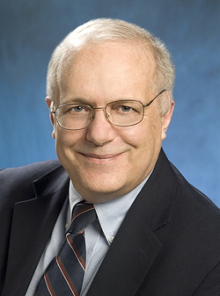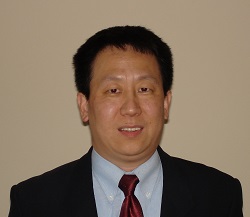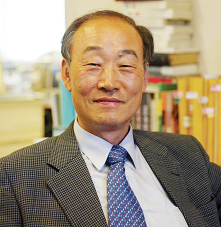Keynote Speakers
Keynote Speech I

Department of Statistics
Center for Nondestructive Evaluation
Iowa State University
Ames, Iowa 50010
wqmeeker@iastate.edu
Title: Reliability in the 21st Century
Abstract:Reliability is an engineering discipline that relies heavily on the application of probability and statistics. Changes in sensor, communications, and storage technologies are changing the nature of reliability field data. An increasing number of modern systems are being outfitted with sensors that capture information about how and when and under what environmental and operating conditions individual systems are being used. In some cases, the physical/chemical state of critical system components can also be quantified and reported. For many systems such information is being downloaded continuously into data farms. In addition, improvements in computing capabilities and investment in developing physics-based models for failure provide another important dimension of reliability information. There are many potential applications for using such data to improve safety and reduce costs but existing statistical methods for reliability assessment and prediction are inadequate for the tasks. This talk reviews some particular applications where the modern field reliability data are used and explores some of the opportunities to use modern reliability data to provide stronger statistical/physical methods that can be used to operate and predict the performance of systems in the field. We also provide some examples of recent technical developments designed to be used in such applications and outline remaining challenges.
Key words: Condition-based maintenance, Dynamic covariates, Materials state awareness, Prognostics, Structural health monitoring
About the SpeakerWilliam Q. Meeker is Professor of Statistics and Distinguished Professor of Liberal Arts and Sciences at Iowa State University. He has more than 40 years of experience working in the application of statistical methods to engineering applications including reliability and nondestructive evaluation. He has done research and consulted extensively on problems in reliability data analysis, warranty analysis, experimental design, accelerated testing, nondestructive evaluation, and statistical computing. His practical experience includes numerous long-term visits to AT&T Bell Laboritories, General Electric Global Research, and Los Alamos National Laboratory. He is a Fellow of the American Statistical Association (ASA) the American Society for Quality (ASQ), and the American Association for the Advancement of Science, and a past Editor of Technometrics. He is co-author of the books Statistical Methods for Reliability Data with Luis Escobar (1998), the second edition of Statistical Intervals with Luis Escobar and Gerald Hahn (2017), 14 book chapters, and many publications in the engineering and statistical literature. He has won numerous awards for his research and contributions to the statistical and engineering professions including the ASQ Shewhart medal. ASA’s 2015 Deming Lecture Award.
Keynote Speech II

Mike and Sugar Barnes Professor of Industrial & Systems Engineering
Professor of Electrical & Computer Engineering
Title: Constrained Statistical Learning for Wind Turbine Performance Assessment
Abstract:Data science has demonstrated its strength in the evaluation and prediction of system behavior and becomes an essential tool in engineering decision making. The success in system analysis, however, requires a deep understanding of engineering systems under consideration, in addition to the knowledge derived from data. This is because a certain system property, be it mechanical, chemical, or biological, could restrict a system’s behavior but a purely data-driven approach overlooks such engineering constraints. In our research undertaking, we incorporate the pertinent yet imprecise engineering knowledge or physical constraints into a statistical learning process via imposing relevant shape/sign constraints on a system response function; the constraints include the requirements of positivity or negativity, monotonicity, convexity, or smoothness of the response function. Such constrained statistical learning, when applied to wind power production data, not only improves the estimation and prediction accuracy of the learning process, but enhances the interpretability of the resulting models and facilitates decisions for operations.
BiosketchDr. Yu Ding is the Mike and Sugar Barnes Professor of Industrial & Systems Engineering, Professor of Electrical & Computer Engineering, and a member of Texas A&M Institute of Data Science, Texas A&M Energy Institute, and TEES Institute of Manufacturing Systems. Dr. Ding received his Ph.D. degree from the University of Michigan in 2001. Dr. Ding’s research interest is in the area of system informatics, and data and quality science. Dr. Ding is a recipient of the 2018 Texas A&M Engineering Research Impact Award, the recipient of the 2019 IISE Technical Innovation Award, and a Fellow of IISE and ASME.
Keynote Speech III

Emeritus Professor in Statistics
President of Social Responsibility and Management Quality Institute
Professor Sung H. Park is an Emeritus Professor in Statistics at Seoul National University, and the president of Social Responsibility and Management Quality Institute. He was the president of Korean Academy of Science and Technology during 2013-2016, and a member of Presidential Advisory Council of Science and Technology in Korea during 2013-2015. He served as the director in the Directorate for Basic Research in Science and Engineering, National Research Foundation of Korea during 2010-2012.
He wrote more than 70 books on statistics and quality management including 7 books in English such as "Robust Design and Analysis for Quality Engineering" (Chapman & Hall, 1996), "Statistical Process Monitoring and Optimization" (Marcel Dekker, 1999), “Six Sigma for Quality and Productivity Promotion” (Asian Productivity Organization, 2003), and “Robust Design for Quality Engineering and Six Sigma (World Scientific, 2008). His three books in Korean, “Modern Design of Experiments”, “Regression Analysis”, and “Statistical Quality Control”, have been the best sellers since their appearance until now. He is really the pioneer in the area of industrial statistics and quality management in Korea.
He graduated from Seoul National University, Korea, in 1968 with a Bachelor of Science in Chemical Engineering. In 1970 he went to the USA to study Operations Research for his Master of Science Degree, and Statistics for his Ph.D. degree at North Carolina State University (NCSU). After graduating from NCSU in 1975, he went to Mississippi State University as an assistant professor in the business college, and then returned to his country, Korea, in 1977. Since 1977 he has served as an associate professor and then as a professor in statistics at Seoul National University (SNU). He has retired from SNU in 2010. He is the only one academician of IAQ (International Academy for Quality) from Korea since 2007.
He was the president of the Korean Society for Quality Management, the Korean Statistical Society as well as the Korean Society for Sustainability Science. He received two prestigious medals from Korean Government; one is ‘Order of Service Merit, Red Stripes Medal’ for his contribution to quality management in 2000, and another is ‘Order of Science and Technology Merit, Hyeoksin Medal’ for his contribution of Science and Technology for Korea in 2015. He also served as Dean of College of Natural Sciences, SNU, during 2000-2002, and as the chairman of Faculty Council of SNU during 2005-2007. He is a member of the National Academy of Sciences, Republic of Korea, which is very prestigious as a scholar.


